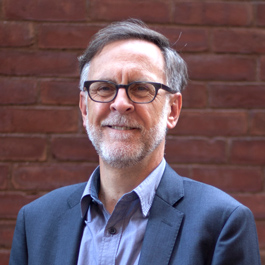
Energy Efficiency and Distributed Resources Finance Manager
City of Boston
Leading Boston Toward Climate Neutrality
When he was a member of the City of Boston’s finance cabinet, Joseph LaRusso took a close look at how the city was purchasing and using energy and thought, “We can do better.”
A dual alum of The Graduate School and the Pritzker School of Law at Northwestern, LaRusso initially worked in private practice, specializing in public finance. Boston’s Treasury Department hired him to bring that expertise in-house.
“During my time in the Treasury Department it occurred to me that the city was frugal in every respect, except when it came to energy,” says LaRusso.
The city’s first foray into energy management was a straightforward financial transaction; the city ceased purchasing electricity from its local electric utility and competitively procured electricity from a third-party supplier. LaRusso drafted the request for proposals that resulted in that procurement. The contract yielded immediate savings — last year alone, electricity supply savings equaled $4.3 million.
In 2007, the mayor issued an executive order requiring the city to take a number of steps to reduce the threat of climate change. The order included, among other things, the call for an 80 percent reduction of greenhouse gas (GHG) emissions by 2050. In 2008, Massachusetts mirrored that goal in the Global Warming Solutions Act (GCA), and a year after that, it established a fund to finance energy efficiency projects statewide through the Green Communities Act. The availability of funding allowed the city’s Environment Department to create a municipal energy unit (MEU) to identify energy efficiency projects, marshal the city and GCA funding necessary to finance them, and keep the city’s own portfolio of municipal assets on track to meet the mayor’s stated citywide GHG reduction goals. LaRusso was offered the opportunity to join the MEU due to his familiarity with the city’s financial operations and his early participation in energy planning.
The ability to leverage GCA funding encouraged city departments to implement an ever-growing number of energy efficiency projects. “Saving money and saving energy are two sides of the same coin,” LaRusso says. “If you want to persuade people to reduce energy consumption, the carrot is always saving money. The rule holds true in municipal government, as well.”
In his role at the MEU, LaRusso is working to implement an energy service contract that will enable the city to plan energy efficiency comprehensively throughout all of its buildings.
“Saving money and saving energy are two sides of the same coin," — Joseph LaRusso (TGS '81, Law '89), Energy Efficiency and Distributed Resources Finance Manager, City of Boston Environment Department
LaRusso is also currently working on a variety of other projects to introduce greater amounts of renewables into the city’s energy mix and to deploy other technologies, such as combined heat and power units and battery storage facilities, that will enhance the resilience of city operations and reap additional savings.
By setting and meeting ambitious goals to reduce its emissions, implementing efficiency measures at scale, and deploying renewables and other distributed resources, Boston continues to lead by example. It has been ranked the most energy-efficient city in America in each of the American Council for an Energy-Efficient Economy’s three biennial City Energy Efficiency Scorecards and just this spring, Boston’s current mayor, Marty Walsh, set a new target: carbon neutrality by 2050.
“We’re raising awareness about energy across the city,” says LaRusso. “Doing so will make energy more affordable, safe, and sustainable for all Bostonians.”